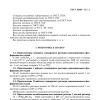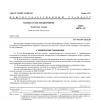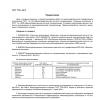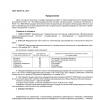A question about career plans can be asked at an interview to any applicant, regardless of the position for which he is applying. Often, having heard from the HR “How do you imagine your career in 2 years, 5 years?” Job seekers are confused. In fact, there is nothing reprehensible in this matter, since the employer's interest regarding the plans of his potential employee is quite natural. Therefore, it is advisable to think over and prepare a response in advance, having previously assessed your ambitions and correlated them with the company's development opportunities.
What do employers want to know?
The question about career prospects is included in the list of standard questions asked to applicants during all stages of the interview. The answer to it can clarify several points for the employer at once: how ambitious the candidate is, whether his aspirations have solid ground under them, or whether they are from a series of mental planning, akin to Manilov's dreams. At the same time, in addition to the immediate career plans of the applicant, his ability to plan is ascertained, and based on the information received, it becomes possible to predict after what time the scope of the position for which he is applying will become too tight for him, and how long he will be able to work in the company without substantial guarantees further development.
There is no correct answer to this question, therefore it makes no sense to get off with phrases that have set everyone on edge that your plans are to “work, work and work again” for the benefit of the company for all subsequent years. It is important for the employer to see a person capable of sound reasoning in front of him, and to understand how justified his claims look. By comparing the applicant's wishes for further professional development with the capabilities of the company in which there is a vacant position, the recruiter can determine how they "fit" together.
According to Oksana Shumilo, HR Specialist, Jay Lab LLC, the question about career plans is one of the most popular among employers and, surprisingly, one of the most “unexpected” for candidates. “Unfortunately, today most candidates either do not plan anything, or plan to grow from a tester to a project manager in six months. In the first case, the question arises about the motivation of a person: what prompted him to respond to this vacancy and how long will he work with us? In the second case, there are doubts about the candidate's adequate perception of his professional skills and, again, the question is, how long will he work with us? It is no secret that for any employer, the indicator of the average period of work of an employee in the company is extremely important. Therefore, neither the first nor the second option can suit the employer. First of all, the candidate must answer this question for himself. It is important to remember that changing jobs “in search of yourself” will make it difficult to find a job in the future.”
What should applicants keep in mind?
When talking about how you see your career in 2.5 years, applicants need to pay attention to several important points, which will be discussed below.
Determine for yourself what you expect from the position you are applying for.
Such certainty will allow, on the one hand, not to be disappointed in the absence of development prospects in the company, since it may turn out that none are foreseen in the near future. On the other hand, do not take on an extra burden of responsibility that you cannot cope with.
It can be noted that you want to reach certain heights in your chosen industry, systematically building your career.
When you apply for a vacancy from a different field than your previous one, justify your decision.
Oksana Shumilo, HR Jay Lab LLC: “The option “Yesterday I was doing marketing, and today I decided that I want to be an economist” again leads the employer to the idea of “search for yourself”, which will not add any positive points to any candidate. If you are really sure that you want to change professional sphere must be able to substantiate it. During my work, I often met candidates who reinforced their desire professional courses, self-learning and, as a result, extensive theoretical knowledge and good test papers. I remember an electrician who successfully worked as a sales manager, an economist who retrained as an html layout designer, and a builder who became a PHP programmer. The list of such candidates is endless. After all, I'm one of them myself."
As an explanation for your interest in a job in a different professional field, tell the employer that you have reached your career ceiling.
Emphasize that you feel in yourself the strength to develop further, show your awareness of the development trends of the chosen professional field. It is advisable to mention that you received additional education in your new specialization, attending trainings and seminars.
Link the answer to the question about your career plans with the development prospects of the company itself.
Before an interview with a future leader, you should carefully familiarize yourself with the activities of the company, study its corporate website, view materials in the press. If you received an invitation for an interview through recruitment agency, ask your consultant to express his opinion on the further development of the company, especially since recruiters, as a rule, have a positive attitude towards such interest from applicants. Having collected such a “dossier”, you will not only be aware of external events related to the employer, but also get an idea of the atmosphere prevailing among your potential colleagues, which will allow you to clearly and balancedly answer your opponent’s questions, demonstrating a desire to grow and develop together with the company.
Even though you want to present yourself in a favorable light in an interview, it is recommended that you answer as honestly as possible.
The candidate's answer to the question about future plans serves as an indicator of honesty, adequacy and the ability to critically assess their competencies. If the applicant tries to guess the answer, then either the recruiter will feel false, or the person himself will face internal contradictions. A sober assessment by the applicant of his own capabilities, reasonable ambitions and a vision of himself in the future are the most important factors in making a decision to hire an employee. Young professionals in particular are encouraged to balance their personal aspirations with the capabilities of the company in which they want to settle.
question question discord
It is necessary to understand the difference between the questions “How do you see your career in 2 years?” and How do you rate your career prospects after 5 years?". In our "high-speed" time, it is considered quite acceptable if an employee has worked in one company for about two years. Therefore, the first question is focused primarily on finding out how the applicant presents and whether he represents his prospects in the company at all.
The second question concerns personal development and becoming a professional. It can be replaced with a more abstract one, such as "How do you see your future?". The answer to it will allow the employer to understand the motivation of the applicant when choosing a job. For example, Sales Representative agrees to travel for the next year and a half, then to take the position of supervisor. In five years, he will already have enough experience to move to a managerial position in the retail or wholesale departments. An example like this shows that the candidate is betting on vertical growth, and therefore, he needs to focus on employment in a company whose priority is to ensure internal personnel reserve, and, conversely, you should not get a job in a small organization where no prerequisites for career growth are foreseen.
At the same time, it is obvious that many people generally prefer to live exclusively in the present and not make any long-term plans, there are also turning points when it is difficult to decide and say something for sure. In addition, not all positions require experienced strategists who can not only paint their future in detail, but also systematically achieve the implementation of their goals. Most specialists prefer to “go with the flow”, conscientiously fulfilling their duties and not striving for career take-offs. Therefore, even if you find it difficult to answer, you should not use banal phrases, such as "I will make my contribution." Your honest answer will allow the recruiter to match you the right company and position. And in cases where the applicant is counting on creative position, non-standard answers are generally welcome.
For most people, a career is primarily associated with a promotion and, accordingly, with an increase in income, and is practically not associated with the complication of functions and an increase in responsibility. Like any struggle, career struggle is associated with the use of various techniques. Understanding the most popular of them will allow you to avoid serious mistakes in building your career. Consider the most common career "traps".
- Wage growth. Receipt new position not always accompanied by a pay rise. In some cases, even a temporary decrease is possible. A sharp "jump up" can serve as some guarantee of a significant increase in wages.
- Career as a way to get fired. Briefly, this trap can be described as follows. You are offered a position "slightly higher" with duties and powers that are not fully understood. You can’t cope, and someone else is already working with your clients. You are no longer needed by this company.
- Increasing efforts. Your desire to take a "higher position" can be used for unjustified "motivational purposes" for you. On the way to getting a promotion, you are faced with tasks that require much more effort. You spend efforts, but they are not enough for your promotion. And there is no growth.
- formal status. For many, a change in the title of a position may be motivational, but this does not expand the scope of authority, responsibility and changes in the field of motivation. An accurate understanding of the probable reasons for your promotion will help prevent a situation of imbalance between income, responsibility and authority.
- You are in line. In this case, we mean a situation where your career stagnation is diluted with varying degrees of success with promises "until the time" or "your time will come soon." In reality, no queue simply does not exist. Often you are asked to wait, only to delay leaving the company as much as possible or to gradually accustom yourself to the idea that you are not suitable for promotion.
- Policy. In some situations career is impossible without joining various corporate and political alliances. Here you need to understand: either you join the alliance as an independent force, or it absorbs you. This has a lot to do with career prospects.
Illusion "Career depends only on me"
Career traps and illusions: Not at all. Willingness to spend a lot of your own efforts is not a guarantee successful career. Here it is important to understand in what situation and how much to "spend" your efforts to achieve an impressive result. Self-confidence (especially in relation to a career) should be pragmatic and expressed in a willingness to act. Belief in your career future is a clear understanding of what you are strong in (powers, knowledge, skills and abilities, etc.), what else you need to be strong or stronger in, in what situation strength requires demonstration, how to demonstrate your force, to whom, with what frequency.
Are your efforts valuable in the eyes of the people on whom your career depends? How to define it? Experiment. Try to put in a little more effort and make sure your line manager notices. For reliability, repeat the experiment again. If the reaction was "negative-neutral" - from indifference or disapproval to the banal "not bad this time", then the likelihood that your efforts are appreciated is minimal.
What is valued by those on whom your career depends?
There are several answers:
- Your super-loyalty: willingness to repeat: "Yes, my lord." And insinuatingly and sympathetically.
- Your mobility: generating ideas and quickly solving problems.
- Your performance: the ability to achieve the desired results.
- Your ability to meet expectations: This is the main and most frequently encountered aspect.
With certain reservations, it can be argued that the ability to meet expectations is the basis of a successful career.
Are you overconfident?
The fact is that there are many factors that influence and determine a career: a leader and your successes, "sworn friends" and the frequency of difficult situations at work, knowledge in the field of the profession and corporate policy, etc. Faith in one's capabilities is not bad, but it is also important to know the external limits. For example, the manager's tendency to promote relatives or colleagues, the manager's perception of you as a competitor, the distribution of key customers and segmentation.
Illusion "Career is luck, chance"
Achieving your own career goals does not allow for a passive position. Waiting for a chance or hoping for luck is the height of frivolity. Building a career is parallel work, everyday work and a multi-way game with dozens of players. The result of such a game is often called luck or chance. Career planning is the setting and achievement of goals that are important for promotion. In addition to being realistic, goals should include ways to achieve them.
How do you tell your boss about your career ambitions?
It is important to first enter the image of a professional who is ready to develop, expend a lot of effort, achieve goals and, of course, be loyal. In addition, such an image should exclude disinterestedness, prudence and excessive personal relationships at work.
Before raising the issue of promotion, it is advisable to make a list of your "strong characteristics" in the following form: function - personal characteristic - result for the leader. For example, function:"Obviously, ongoing supervision will be required to manage the sales team." Personal characteristic:"I'm consistent enough to systematically control." Result for the leader:"That is why there will be no problems with the timeliness of reports and their quality."
It should be especially noted that only what is of value to the manager should be offered as a result. The logic of a conversation with a manager regarding your career ambitions is something like this:
- Setting and explaining the goal. For example, better "Ivan Ivanovich, at the moment you are considering various candidates for the position of team leader. How much time are you ready to devote to considering my candidacy?", worse "Ivan Ivanovich, can I discuss the issue of my career promotion?"
- Clarifying the leader's expectations. You should ask the manager a few questions in the dialogue mode about his expectations regarding the candidates. For example, better "Ivan Ivanovich, tell me, please, what are the main requirements you put forward regarding candidates?", worse "Tell me, am I suitable for this position?"
- Self-presentation and agreements. A story about yourself using the model "function - personal characteristic - result for the leader". If the leader makes a decision (positive or negative), it is advisable to ask a few questions at the end of the conversation about why the leader made such a decision. The information obtained in the future will allow you to avoid mistakes in such negotiations.
Illusion "The main thing is my abilities"
Of course, abilities, like certain personal qualities, play important role in deciding on your appointment. However, this would be absolutely fair only if "career decisions" were made exclusively on a rational basis. Unfortunately, it is not. When making such decisions, the leader is often guided by the following motives.
- Pragmatics. Unwillingness to lose a good employee and get a mediocre leader.
- Fears. Perhaps the leader is afraid of the emergence of a strong potential rival.
- Policy. Your appointment may change the balance of power not for the better for the leader.
- Emotions. Your appointment is viewed by the manager as emotionally unattractive.
Below is a list of the most important, from our point of view, qualities for career advancement. Your task is to try to evaluate them as objectively as possible and set goals.
- Persuasive presentation. How do you perceive the person on whom your career advancement depends? How do you influence it? What are you consciously doing to influence it in the future?
- The ability to emphasize one's own importance in the eyes of management. The ability to create situations when you are needed. Highlight the value of what you do.
- Internality and moderate optimism. Are you more dependent on events, or events on you? How do you influence the situation in the department, company? How much depends on you? What do you intend to do in the future to reduce your dependence on external circumstances? Restrained optimism and an internal position, expressed in the attitude "most of the events depend on me, and I create most of the events" - this is the effective internality of the manager.
- Consistency and predictability. How often do you make small (and not so) promises, and then do not keep them? Do you often act so out of the ordinary that it upsets management? What do you intend to do in the future to improve your "consistency and predictability" rating? Your chances of getting a promotion largely depend on how you are perceived as a consistent and predictable person. Only a consistent person is perceived as "carrying fewer threats" and "more likely to show the expected result." In addition, consistency is most associated with goal achievement and thoughtfulness.
- Efficiency. How do you understand the result of your professional activity? How do you evaluate the effectiveness of your professional development? How do your colleagues and management perceive the results of your activities? How do you report your results to management? How do you intend to change your performance? For what? The effectiveness of the activity largely depends on the level of abilities. But the result is expected at a certain level and at a certain speed. There is an important difference between the result of the activity and the result of its perception by the manager. The latter is the most important for a career.
- Quick rapport. How often do you misunderstand what your boss expects from you? How is it shown? Which practical steps What are you doing to increase mutual understanding? How are you going to change the current situation? In the process of joint work, there are always a lot of difficulties and problems dictated by low mutual understanding (coherence of actions, justification of expectations, commensurate worldview, etc.). The one who quickly reaches a common language with the boss, understands his expectations, demonstrates loyalty and consistency, he is more likely to achieve career goals.
The "career is the ability to please" illusion
In many ways, this is true, because, according to research, it is socially attractive people who are more likely to achieve career heights than less attractive people. But what about the fact that not the most attractive people can be leaders? The fact is that if a person often resorts to a "beauty tool" in his career advancement, then he automatically becomes dependent on the emotional state of other people. In some cases, a person specifically develops "the ability to like." But at the same time, he inevitably pays little attention to self-education and issues of self-development in the professional sphere.
Social attractiveness (appearance, manners, speech, etc.), of course, causes positive emotions but if you don't care about professional development, then career risks become more than high. But often a highly professional person who looks unrespectable becomes less competitive compared to a less professional, but more attractive one.
There are several aspects on which social attractiveness depends. Your task is to critically analyze each aspect in relation to yourself and try to make the necessary adjustments.
- Appearance. A banality that has not lost its relevance today. Clothing style, general condition (haircut, skin condition, hands, smell) and, of course, shoes - all these are the main components of a person's appearance. In appearance it is important to exclude extremes, inconsistencies and untidiness.
- Manners. Good manners are generally associated with poise (in demeanor, voice, and gestures), benevolence (moderate positive emotions, subtle smiles and open eyes), tact (avoiding ambiguity, potentially unpleasant phrases), and sociability (as the ability to maintain a comfortable conversation with most people).
- Orientation towards others. The ability in the process of communication to be attentive to the interlocutor and talk more about him than about himself. We seem more attractive to those people who talk about us, and not about themselves. In speech, the focus on the interlocutor is manifested in the change of "I", "I", "mine" to "you", "you", "your".
Denis Valerievich Yartsev,
candidate of psychological sciences,
business coach with seven years of experience,
Executive Director trading company
in the field of security
Article provided by Elitarium.ru
· Please describe your typical working day.
· How would you describe your ideal manager? Subordinate? Employee?
What kind of people do you find it difficult/easy to work with? Why?
· What did you like/dislike the most about your last job?
· Please describe your ideal work environment.
What motives drive you? Why?
What qualities make you an effective leader?
· What is your highest career achievement so far? Why?
· Recall and describe a situation when you were under pressure at your last job. How did you deal with it?
· What, in your opinion, is the duty of the employer to the employee?
How do you feel about business trips?
· Tell us about how often and for how long you had to go on business trips before.
How do you feel about moving? Are there places where you would not like to move?
· Which of your responsibilities in your last job did you find difficult?
How do you rate your career progression so far?
· Tell us about the problems you encountered at your last job.
How is your current job different from your previous one?
· Which of the positions (positions you hold) was paid the best/worst of all?
How do you think your current job has prepared you to take on additional responsibilities?
· What was the most painful and unpleasant situation for you throughout your career? Why do you want to leave your current job?
· What do you think about the leadership style that developed in your department/unit at your last job?
· If I asked your supervisor to describe your work, what would he say?
What would you do if...? How would you deal with...?
· What prospects do you see in the new place of work compared to the old one?
· What would you like to get for yourself (what benefits) in a new job?
· Did the military service influence the field you chose for yourself?
· Tell us, please, what did you do in the army?
· What do you want to achieve in your career in the near future and in the future?
· What would you like to avoid in your future work?
· What are your requirements for wages?
· Who or what influenced you in setting career goals? How exactly?
· To what do you owe your success?
· What do you think is your greatest strength?
· In what areas do you need to improve? How are you going to improve?
· What kind of leader do you think you are? subordinate? Employee?
· What part of your job brings you the most satisfaction?
· How do you complete tasks that you don't like?
· How do you allocate your time?
What is your leadership style?
What have you learned from each of your previous jobs?
· Please give examples of the decisions you made in the course of your work. What were the consequences of these decisions? How do you make decisions?
Are you able, from your point of view, to distribute work between subordinates? By what criteria
· What do you consider your standard of work discipline - in relation to yourself and your subordinates?
· Give, please, an example of a project, the implementation of which did not correspond to your plans. What happened?
· What attracts you to this position in our company?
What are your reasons for joining your current position?
What is the biggest responsibility in your current job?
· Describe your progress at your last job?
What did the leaders praise/criticize you for?
What can you offer our firm?
Does the proposed position fit into your personal career plans?
In what work-related situations do you feel most comfortable/stressed and constrained?
· Why do you agree to pay reduction?
· Why do you want to change the field of activity?
· What is the main responsibility of the leader/subordinate?
· How do you feel about the same type, repetitive tasks?
How do you feel about the fact that your work is carefully monitored?
How do you feel about working overtime?
How do you feel about the fact that you can be called to work at any time?
What reasons would you consider reasonable?
in order to work in this firm until retirement?
· What reasons could make you leave this job?
How would you deal with a subordinate who is consistently late?
· This job will require you to be able to... What experience do you have in this area?
· What, in your opinion, will be the most difficult and most satisfying in this position?
If you are asked to do work that is not part of your functional responsibilities what will you answer?
· What do you think "company loyalty" means? To what extent does it extend?
· How will you behave when discussing dissatisfaction with your work with your boss?
· What could your previous employer do to convince you to stay?
Have you ever had to fire someone? Tell me how it was.
· Do you want to give me any information about your qualifications that will help me make a final decision?
Publication date 07.12.2004
That you are the very necessary employee for him, who should fill the existing vacancy?
Going to an interview with an employer, each applicant tries to determine in advance what range of questions he will have to answer, what will be of interest to his potential boss. And since the range of questions can be quite wide, it is better to think about the answers to each of them in a timely manner so as not to get confused during the interview if the question turns out to be unexpected.
Today we are starting a series of publications in which Tamara Achba, marketing assistant at the KELLY SERVICES recruitment agency, will introduce our readers to the most common questions asked by employers and give recommendations on how best to answer them.
Most likely, one of the first questions will be:
Why do you want to work in our company?
To answer convincingly, you need to gather information about the company's activities in advance and prepare a dossier. Then we can safely say that you believe that the company will be able to guarantee you stability and provide a favorable working environment, and that in such an atmosphere you will be able to work most efficiently.
It must be understood that the representative of the company is not just looking for an experienced engineer or secretary, he needs someone who can quickly contribute to the current projects of the company. If you don't know what company projects you will be involved in, it's best to ask about it. By asking this question, you can find out what your personal qualities will make the right impression on the employer.
More "narrow" questions will follow:
Tell me how your work relates to general plans your department and company.
This question not only tests your understanding of the mission of your department and company, but also your ability to fulfill your responsibilities as a team member.
What part of your job do you consider the most important?
This question determines the ability of the applicant to manage their time and prioritize, as well as the tendency to avoid some kind of work.
There may also be trick questions. For example:
What did you like and dislike about your previous job?
The interviewer is looking for inconsistencies. Use the information about the company and the upcoming job that you were given at the beginning of the interview. Keep your answers short and positive, and don't be critical of your former employer.
What did you learn from your previous job?
Please refer to your professional and business qualities acquired through a previous work biography.
How do you rate your professional growth so far?
Be positive in your assessment of your professionalism, but let the interviewer know that your best job you are ahead, and your potential allows it. Convince the company representative that you see an opportunity to continually learn and contribute more and more to the company.
How long would you work for our company?
You can answer in different ways, for example: “I would like my career development to be connected with this company. As long as I have the opportunity to grow professionally, I'm not going to leave. How long do you think I will have this opportunity?”. It is hardly worth limiting your desire to work in this company to specific dates, that is, to say that you want to stay here, say, five or ten years. Such an intention must be justified, and not just the good will of the applicant.
How soon can you make a contribution to our company?
Before answering this question, you need to find out in what area, in what area of work, you are expected to contribute immediately.
Where do you see yourself in five years?
The best answer is to communicate that you want to be recognized as a professional and reliable team member. As far as promotion is concerned, it depends on your manager's promotion. This is the place to ask what growth opportunities exist for you in the company.
Name your biggest accomplishments.
In your answer, refer to what you have achieved at your job. You can start like this: “Although I am determined that my greatest achievements are yet to come, I am proud of what I have done…”. And further concrete examples your production successes, which really look worthy.
Tell us about your career progression.
The answer to this question reveals your personality, your goals, your past, and influences your future. You need to tell not only about your progress, but also that it was the result of long efforts (long and hard work), significant contributions to the success of the company and your brilliant ideas.
What are your strengths?
Here it is better to focus on your professional skills and personal qualities.
What is most interesting for you in the proposed work?
To answer this question you also need to have detailed information about future work. In your answer, you must emphasize the personal qualities that you could show in this work, you can also refer to your not only professional, but also human, personal interest in this field of activity.
What do you expect from your new job?
The best answer is that you want to work in a company where your personal qualities and professional skills will make a significant contribution to the success of the company. Avoid talking about what you want from the company - you should talk about what you can give to your employer.
| Previous article: ->> |
Does it take too much time to look for a job in Minsk? Are you looking for a platform where standing vacancies are collected all over Belarus: in Minsk, Gomel, Mogilev, Vitebsk, Brest and Grodno? Then go to WORK.TUT.BY!
Our database receives the most relevant offers daily. There is a job for experienced craftsmen and beginners with no experience.
Show all
The functionality of the site WORK.TUT.BY will save your time! Employers will be able to quickly search for employees, and applicants will be able to select interesting vacancies for themselves.
Are there any vacancies in Minsk? Need specialists who are interested in working in Minsk and the region?
Get acquainted with regularly updated resumes on WORK.TUT.BY! Here you will find candidates for vacant position with the necessary experience and skill set. All you need to do is post a job. Moreover, by accessing our database, you yourself choose the time to study interesting resumes.
All the tools on the site have proven their effectiveness more than once. Using them, you will definitely reduce the time spent on posting and closing vacancies in Minsk and other cities of Belarus. Now all the information about those who are looking for work in Minsk is at your disposal at the first request.
WORK.TUT.BY - a win-win site for job search!
Site administration: LLC "100 WORKS HERE", 220089 Minsk, Dzerzhinsky Ave., 57,10 floor, room 45-1. Working hours of the enterprise: Mon.-Fri. 09.00-18.00, lunch 13.00-14.00, closed days - Sat., Sun. The site is open 24/7. e.mail LLC "100 WORKS HERE" [email protected]
Settlement account BY12ALFA30122600730090270000 CJSC Alfa-Bank 220013 Minsk, st. Surganova, 43-47














